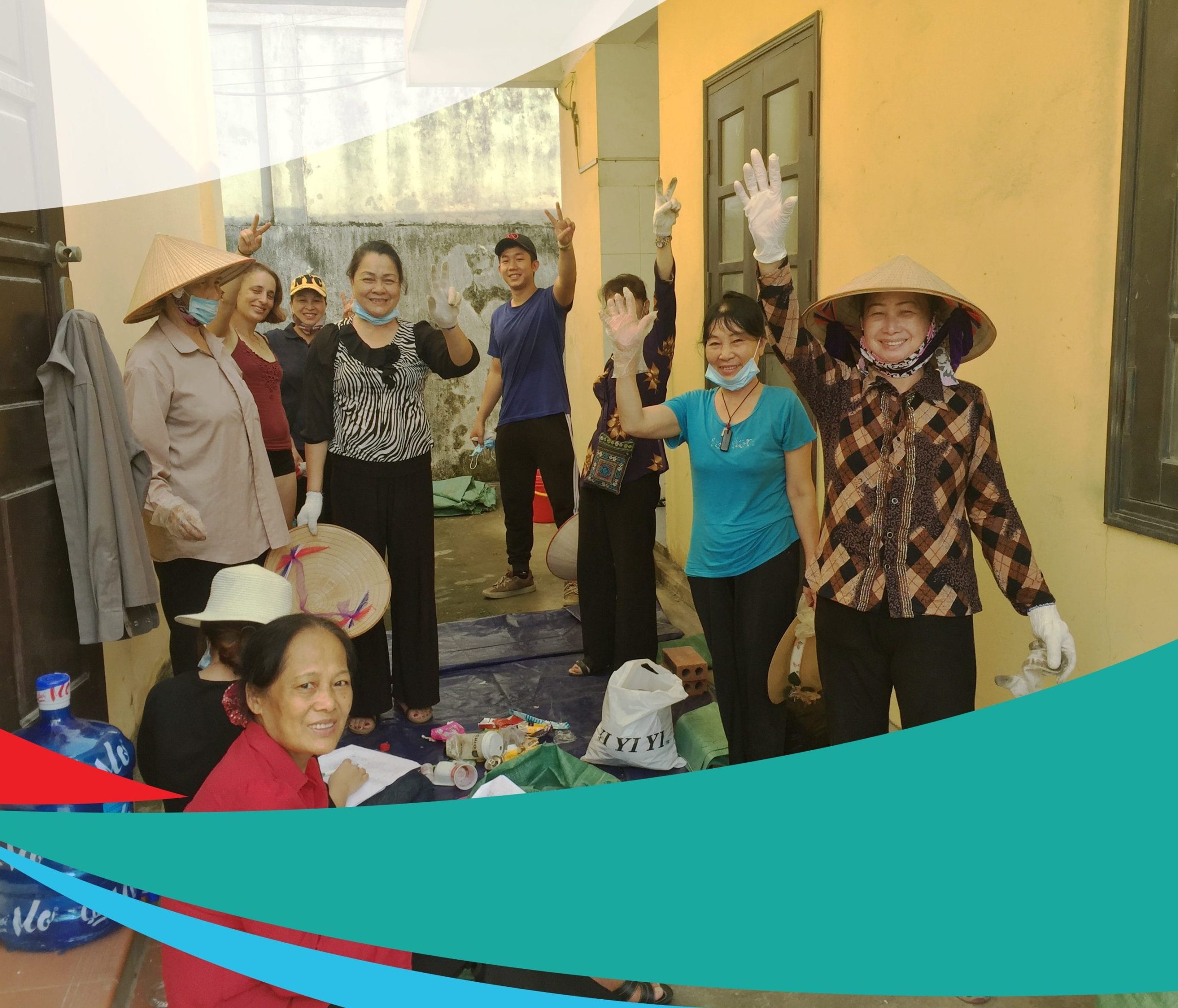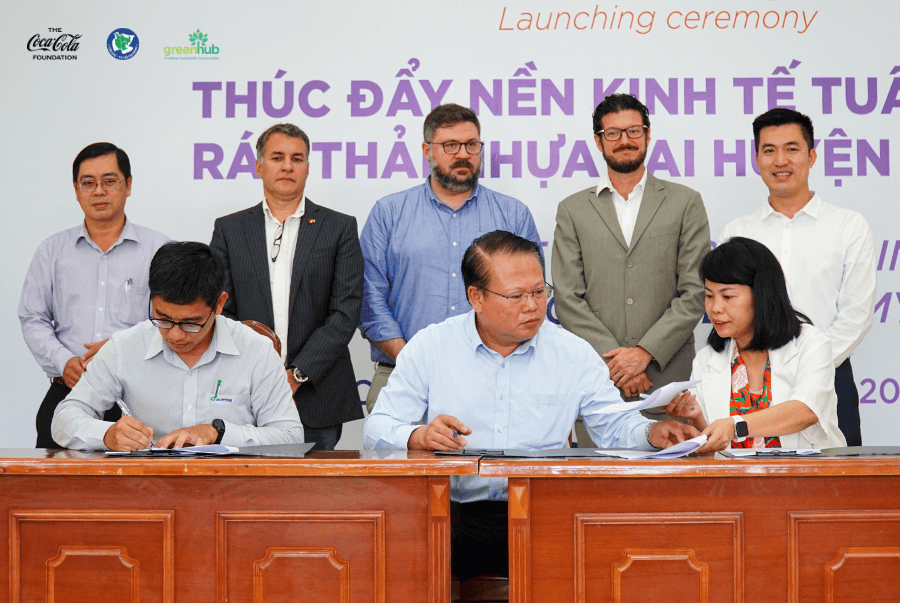
- Project Title:
- Building a “Plastic Action Network” and Linkages with Government, local businesses, Youth and Women to Reduce-Reuse-Recycle (3Rs) Plastic Waste in Vietnam (PAN project)
- Location:
- Ha Long city, Quang Ninh province, Vietnam
- Period:
- 3 years (August 2018 – May 2021)
- Donor:
- Coca-Cola Foundation
Building a “Plastic Action Network” and Linkages with Government, local businesses, Youth and Women to Reduce-Reuse-Recycle (3Rs) Plastic Waste in Vietnam, grant requested funding from Coca-Cola foundation. In context, Vietnam’s rapid economic growth and urbanization have directly increased solid waste generation. Over 30 million tons of waste is produced in Vietnam annually, a third coming from urban areas. Only 10% of all waste is recovered for recycling or reuse. Of the 450 landfills, it is estimated that 80-85% pose an environmental risk causing pollution of air soil, groundwater and waterways from inadequately managed contaminated water and waste. The situation is especially critical in Vietnam’s coastal areas, coastal cities and river banks, where most of Vietnam’s population, especially the poor, increasingly live and comes into contact with plastic waste. Vietnam has been listed as one of the top 5 countries contributing to the world’s unmanaged plastic waste entering the ocean, with an estimated 2,500 tons of plastic waste discharged across Vietnam daily.
Why the Plastic Action Network Project is focused on Ha Long Bay (Quang Ninh province)
Ha Long Bay, 165 km. from Hanoi in Quang Ninh province in the northeast of Vietnam includes a coastline of about 120 km., with 755 islands, and the provincial capital city, Ha Long City. It is a Special National Landscape Site under the Cultural Heritage Law, also protected by a number of other provincial and national laws and governmental decrees including the Biodiversity Law, the Tourism Law, the Environmental Protection Law, the Fishery Law, and Marine Transport Law. In 2014, it was reported that about 87,120 tons of solid waste were generated in Ha Long City, 16% is a plastic waste. In the marine area, each overnight cruise boat in Ha Long Bay is estimated to produce 3kg of solid waste per day per passenger. In Ha Long City, waste is generally either burned or land-filled, with no significant recycling or reuse: some informal private recycling agencies pick up some valuable materials such as plastics and metals directly from households and enterprises. Perceptions and public opinions of waste collection operations suggest minimal 3R efforts, major gaps in the waste collection, including inadequate collection receptacles and services or regulation of vessels; as well as insufficient institutionalized programs of environmental education, understanding of health risks, participatory community approaches or enforcement.
In 2014, the Ha Long – Cat Ba Alliance, was established by the IUCN with the government, business and Vietnamese NGO partners, including GreenHub, and funded as a project by the United States Agency for International Development (USAID). The focus is to preserve the natural integrity and restore the biodiversity of the Ha Long Bay World Heritage Area by engaging private tourism enterprises, government, and local communities.
The Alliance has maintained frequent stakeholder leadership sessions, coastal cleanup events, provided technical support to UNESCO in the management of Ha Long Bay, and formed a management board to strengthen business engagement in tackling environmental issues as wastewater treatment from tourism cruise service providers. This Alliance has gained strong cross-sector traction and momentum, unique in the history of Ha Long Bay aquatic conservation and business partnerships.
To greatly leverage the impact of this Alliance, GreenHub has formed a strategic partnership with local and national organizations in Ha Long to propose this investment project to the Coca-Cola Foundation; “Building a Plastic Action Network and linkages with government, local business, youth and women to Reduce-Reuse-Recycle (3Rs) Plastic Waste in Vietnam”. This network driver of the project addresses the deficiencies of past initiatives that did not establish a sustainable action group to enable government, business, civic groups, professional organizations, communities and individuals to cooperate in building and demonstrating benefits of improved plastic waste treatment capacity. This will lead to enhanced well-being for citizens, new community economic opportunities, especially empower disadvantaged women and improved environmental and water quality.
Activities:
Component 1. Model participatory leadership in land and marine plastic 3R
- Analyze stakeholders and networks (present and potential) involved in plastic waste management and recycling
- Establish a highly committed stakeholder Plastic Action Network and science-based plastics 3R strategic plan
- Technical meetings, 3R training in informal and formal sectors to promote regular learning and shared solutions
- Mobilize financial resources from the private sector and government to actively sustain the network
Component 2. Community recycling, economic empowerment, entrepreneurship
- Create business “Waste Collaborative Groups” – WCG [Women’s Union + Women Waste Pickers] in Ha Long pilot areas
- Train WCGs in micro-business skills and support safe waste/plastic separation and handling in supply chains
- Organize Community/Business/Government dialogues to strengthen and sustain marketing in supply chains
Component 3. Technology-based solutions adapted to local community scales and actionable knowledge
- Situation analysis of plastic waste sources to Ha Long, city and bay, linked to global research programs (CSIRO)
- Supply/value chain study of recycling and market demand for waste and recycled plastic products
- Review and mobilize innovative technologies for community recycling initiatives to actively sustain the network
- A pilot and demonstrate market research and recycling approach using ultrasonic technologies, with project partners
Component 4. Social Media and Traditional Communications Campaign: Awareness Raising and Behavior Change
- Develop social media communication tools on community and environmental health plastics impacts, and opportunities
- Conduct culture-based art-work, social events, contests on plastic 3R in Ha long city, to change local and tourist practices
- Implement recycling workshops (“Xưởng tái chế”) as a leaning model to promote plastic 3R for youth groups, schools
- “Proof of Concept” policy dialogues with stakeholder leaders to advocate new plastic 3R actions and alliances


